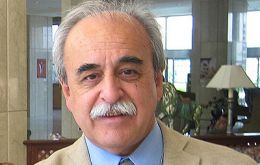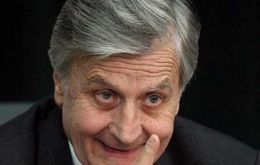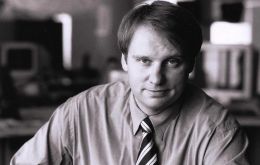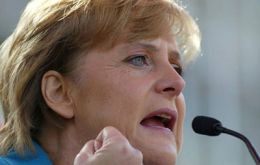MercoPress. South Atlantic News Agency
Tag: European Central Bank
-
Monday, June 13th 2011 - 16:25 UTC
Unasur, looking at the EU, freezes project for common currency and central bank

The Union of South American Nations, UNASUR has frozen the project for a common currency and Central Bank following on conclusions from the European Union experience (and crisis), said the Argentine representative before the organization.
-
Thursday, June 9th 2011 - 19:18 UTC
Euro central bank expected to increase interest rates next month

The European Central Bank (ECB) has signalled that it will raise interest rates next month, from 1.25%. Earlier on Thursday, the ECB kept rates unchanged for the second month in a row, after increasing them in April for the first time in almost two years.
-
Friday, May 27th 2011 - 09:11 UTC
Top economists anticipate ‘restructuring’ of Greek debt or ‘booting’ out of the Euro

Nouriel Roubini, the New York University economist known as Dr Doom, says Greek restructuring would not bring down Europe's financial system. The economist, who earned his nickname by predicting the global financial crisis, says an orderly debt restructuring could pre-empt more trouble.
-
Sunday, May 22nd 2011 - 12:32 UTC
European powers endorse French minister Lagarde as next IMF chief

European leaders raced Saturday to nominate a successor for fallen IMF chief Dominique Strauss-Kahn before a G8 summit in France next week, with French Economy Minister Christine Lagarde in pole position.
-
Thursday, May 12th 2011 - 20:05 UTC
Italy’s Draghi receives support from Angela Merkel as next ECB president

German Chancellor Angela Merkel expressed support for Italy’s Mario Draghi as the next president of the European Central Bank, removing the final obstacle to his appointment to Europe’s top monetary post.
-
Monday, April 18th 2011 - 21:51 UTC
Finland’s anti-Euro strong showing could block Portugal’s bailout negotiation

What’s the link between Portugal's bailout negotiations and Finland? Well negotiations began under a cloud Monday after an anti-Euro party scored big gains in a Finnish election and immediately vowed to derail the pending rescue.
-
Monday, April 11th 2011 - 23:50 UTC
FT forecasts Spain will be next in seeking financial assistance

The mix of high external indebtedness, the fragility of the financial sector and the probability of further declines in asset prices increase the probability of a funding squeeze at some point means that “Spain will be the next country to seek financial assistance from the EU and the International Monetary Fund”, argues one of the Financial Times respected columnists.
-
Thursday, April 7th 2011 - 19:05 UTC
Euro zone raises interest rate fearing inflation; “sorry peripheral countries”

Euro-zone interest rates have been raised to 1.25% from the record low of 1% by the European Central Bank (ECB). Interest rates had been held at 1% for just under two years following the financial crisis and global recession.
-
Saturday, March 12th 2011 - 23:39 UTC
Euro-zone tightens budget rules; bail-out facility will buy bonds directly from governments

European leaders widened the scope of the Euro’s rescue fund, authorized it to buy government bonds and eased the terms of Greek bailout loans as they unexpectedly pushed through fresh measures to end the bloc’s debt crisis.
-
Tuesday, February 22nd 2011 - 00:00 UTC
A fatiguing marathon ahead for debt strained Euro zone countries, says ECB

European Central Bank policymaker Axel Weber said that debt-strained Euro zone countries must make the most of the breathing space bought by aid measures and warned them the hardest part of the reform process was still ahead.
